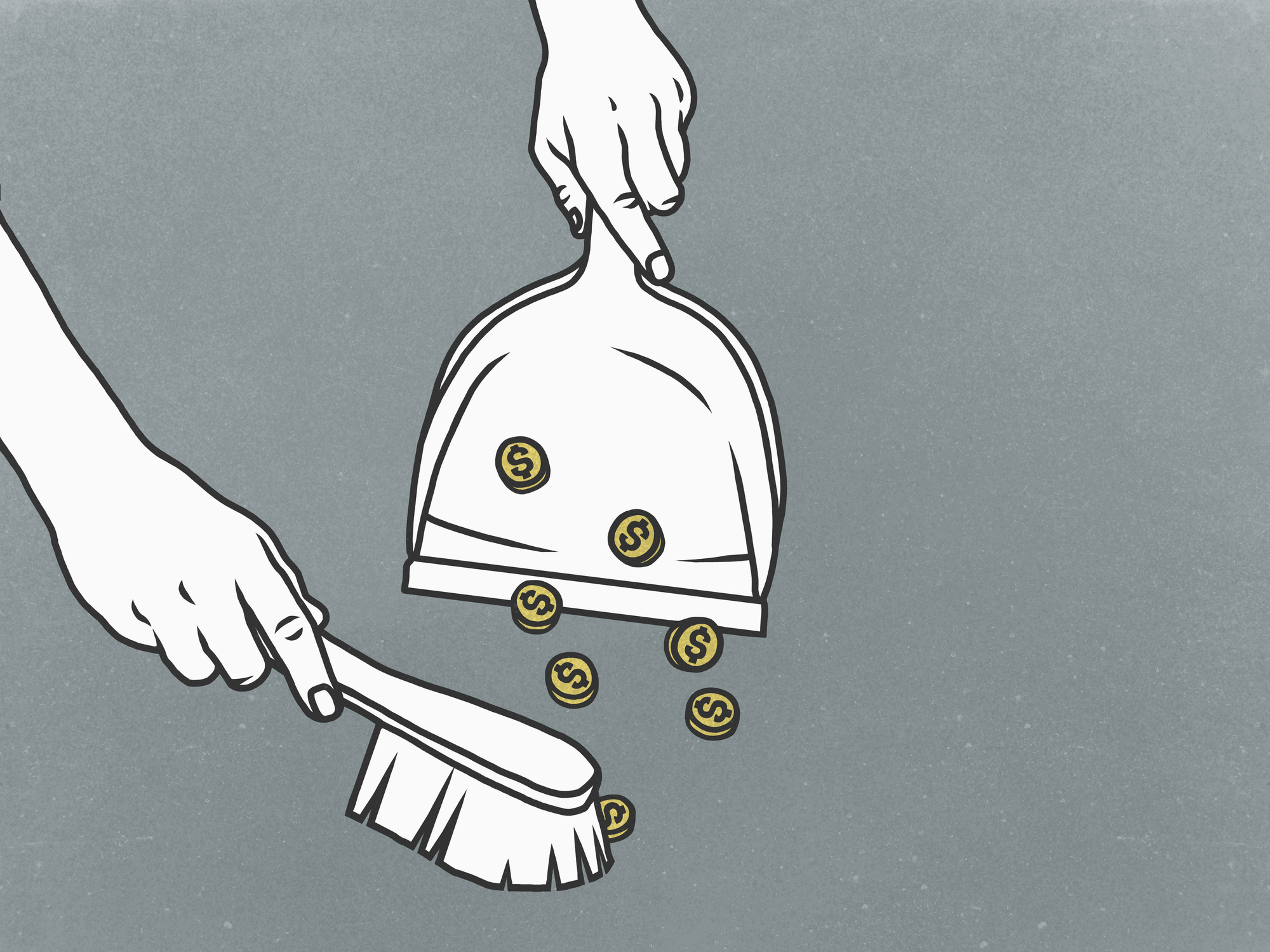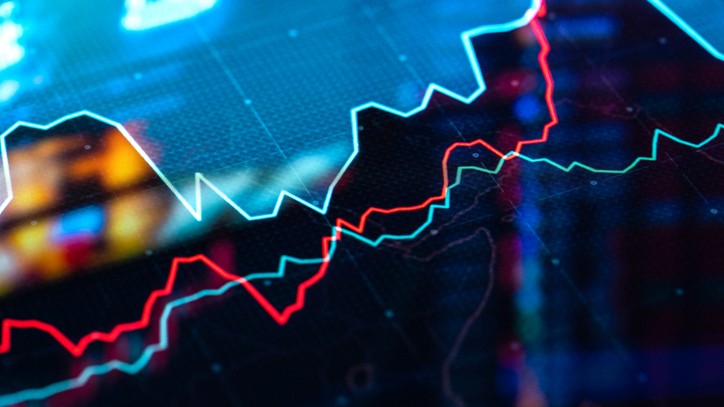How to Earn a Decent Yield From Your Sweep Account
Money in your sweep account that's waiting to be invested can still earn a solid yield.


Profit and prosper with the best of Kiplinger's advice on investing, taxes, retirement, personal finance and much more. Delivered daily. Enter your email in the box and click Sign Me Up.
You are now subscribed
Your newsletter sign-up was successful
Want to add more newsletters?

Delivered daily
Kiplinger Today
Profit and prosper with the best of Kiplinger's advice on investing, taxes, retirement, personal finance and much more delivered daily. Smart money moves start here.

Sent five days a week
Kiplinger A Step Ahead
Get practical help to make better financial decisions in your everyday life, from spending to savings on top deals.

Delivered daily
Kiplinger Closing Bell
Get today's biggest financial and investing headlines delivered to your inbox every day the U.S. stock market is open.

Sent twice a week
Kiplinger Adviser Intel
Financial pros across the country share best practices and fresh tactics to preserve and grow your wealth.

Delivered weekly
Kiplinger Tax Tips
Trim your federal and state tax bills with practical tax-planning and tax-cutting strategies.

Sent twice a week
Kiplinger Retirement Tips
Your twice-a-week guide to planning and enjoying a financially secure and richly rewarding retirement

Sent bimonthly.
Kiplinger Adviser Angle
Insights for advisers, wealth managers and other financial professionals.

Sent twice a week
Kiplinger Investing Weekly
Your twice-a-week roundup of promising stocks, funds, companies and industries you should consider, ones you should avoid, and why.

Sent weekly for six weeks
Kiplinger Invest for Retirement
Your step-by-step six-part series on how to invest for retirement, from devising a successful strategy to exactly which investments to choose.
Gone are the days when cash was trash. Now, it's a valued asset that can earn 5% a year. That's why it's important to make sure the ready money in your brokerage account is earning a competitive yield.
A brokerage sweep account, sometimes called a core or settlement account, holds your uninvested cash. When you sell a security – a stock, mutual fund or exchange-traded fund, say – the proceeds are placed in the sweep account. And when you buy a security, cash in the account pays for the trade. It all happens automatically.
But here's the rub: Some brokerage firms park your cash in accounts with good yields, while others put it in holding places with not-so-good yields.
From just $107.88 $24.99 for Kiplinger Personal Finance
Become a smarter, better informed investor. Subscribe from just $107.88 $24.99, plus get up to 4 Special Issues

Sign up for Kiplinger’s Free Newsletters
Profit and prosper with the best of expert advice on investing, taxes, retirement, personal finance and more - straight to your e-mail.
Profit and prosper with the best of expert advice - straight to your e-mail.
At Fidelity, for instance, cash in retail brokerage and retirement accounts sits in a money market mutual fund that yields a healthy 5.0%. Vanguard's default settlement account, a government money market fund, yields 5.3%. By contrast, Charles Schwab offers a choice of two sweep accounts. Both yield 0.45%. And E*Trade offers little choice – most customers land in a bank deposit program that currently yields 0.01% for balances of $499,999 or less. (All yields and data are through November 30, unless otherwise noted.)
Of course, sweep accounts are supposed to be temporary holding places, not cash management accounts. You can't write checks or pay bills from a sweep account, for example. "It's a settlement account, for the liquid cash you have at your brokerage," says Greg McBride, Bankrate.com's chief financial analyst.
If your brokerage firm offers a government money market fund as its default sweep account, you probably don't need to worry about your settlement account yield or make a change. But if your brokerage account cash isn't earning 4% or better, it may pay to consider alternatives.
Finding the right place for your idle cash isn't just about getting the best yield, however, says Peter Crane, president of money-fund-tracker Crane Data. Other factors matter too, such as how soon you plan to use your cash and how much of it you have. Keep these tips in mind before you move your money out of a sweep account.
Know your options when it comes to sweep accounts
Some firms let you choose a different default sweep account – a bank account, say, or a government-debt or muni-bond money market mutual fund. If your firm doesn't (and you don't like its default option), you'll have to move cash on your own to a competitive money market fund.
Schwab guides investors who want to boost their cash yield to money market funds, including money funds that hold government debt or municipal bonds. The taxable money fund yields range from 5.06% to 5.25%, and they have no transaction fees or investment minimums. But you don't get instant access – the money will be available in your sweep account the next day if you sell shares in the money fund by 4 pm Eastern time.
Vanguard offers as a second option a bank sweep account called Vanguard Cash Deposit, which yields 3.7% as of August 31. But Jeffrey DeMaso, editor of The Independent Vanguard Adviser, a newsletter about Vanguard funds, favors the default government money fund over the cash deposit account, in part because the money fund offers a higher yield.
Make sure your money is accessible
Where you hold your money matters, depending on how you plan to use it. "Convenience is the most important factor," says Crane. Funds you want to put to work immediately in the event the stock market takes a dip are best held at the ready in your brokerage account, even if that's in a low-yielding sweep account. Otherwise, "you could miss a buying opportunity of a lifetime," says Crane.
The caveat is how much money you're sitting on and how long you plan to hold it. If it's $100,000, $20,000 or even $10,000, a 5.0% yield over one year can be meaningful ($500 to $5,000). Unless you're planning to invest the whole pot in short order, it may be worthwhile to shift some of the cash to a higher-yielding money fund.
Don't overthink money market funds
The vast majority of money market funds invest in short-term government debt, says Crane, and "it really doesn't matter which one you pick." The two biggest are the Fidelity Government Money Market Fund (symbol SPAXX, expense ratio 0.42%, seven-day yield 5.0%) and the Vanguard Federal Money Market Fund (VMFXX, 0.11%, 5.3%).
There's no minimum on the Fidelity fund. But the Vanguard fund requires a $3,000 initial investment – unless you're a Vanguard brokerage account customer, in which case there's no minimum. Just remember that if you invest in a money market fund outside of your sweep account, transfers may not be instantaneous.
Don't obsess about yields in the same ballpark
People tend to dither over choosing a fund with a 5.25% yield or one at 5.00%, says Crane. That's annualized. You'd have to leave the cash for 12 months to earn the full yield, and even if you do, the difference in earnings may not amount to much. Over the course of a year, for instance, you'd earn $1,050 on a $20,000 balance at 5.25% and $1,000 at 5.00%.
That said, money market funds with yields that seem too high are a red flag. The Federal Reserve has set its short-term interest rate target between 5.25% and 5.50%. If a money market fund yields 6%, says Crane, "You have to ask yourself why. The fund may be taking on some added risk."
All yields are net of fees and are annualized. Money market funds quote seven-day yields, and bank-issued money market deposit accounts and savings accounts cite annual percentage yield (APY), which includes the effect of compounding interest. They're calculated differently, so these yields "aren't necessarily apples to apples, but they're comparable," says Bankrate's McBride. "They're both projections on how much you'll earn over the course of the coming year."
Skip municipal-bond-based money market funds
Municipal debt generates income that is exempt from federal, and sometimes state, income taxes. But unless you're in the highest tax bracket, or you live in a high-tax state such as California or New York, "ignore them," says Crane.
For starters, the yields on municipal-bond money funds tend to bounce around a lot. And the tax-equivalent yields on these funds aren't as enticing unless you're a very high earner. For instance, the 3.38% yield on the Vanguard Municipal Money Market Fund (VMSXX), the biggest retail fund, translates to a tax-equivalent yield of 4.44% for investors in the 24% federal tax bracket. But the tax-equivalent yield for those in the 35% bracket, including the extra 3.8% Medicare surtax on investment income that applies to certain high income earners, jumps to 5.52%.
Consider Treasury bills for cash you won't invest right away
These U.S. Treasury IOUs have maturities of less than one year (they're issued in four-week, eight-week, 13-week, 17-week, 26-week and 52-week maturities). Recently, one- to three-month bills yielded nearly 5.5% or more; four-month and six-month bills, roughly 5.4%.
"This flexibility allows investors to potentially earn a higher return on their savings and still have access to their funds when needed," says Jonathan Bird, a certified financial planner in Phoenix, Arizona.
You can buy them through your broker, typically for a minimum of $1,000. Or consider a T-bill exchange-traded fund, such as the SPDR Bloomberg 1-3 Month T-Bill ETF (BIL, 0.14%, 5.3%) or the iShares 0-3 Month Treasury Bond ETF (SGOV, 0.07%, 5.2%).
Note: This item first appeared in Kiplinger's Personal Finance Magazine, a monthly, trustworthy source of advice and guidance. Subscribe to help you make more money and keep more of the money you make here.
Related content
Profit and prosper with the best of Kiplinger's advice on investing, taxes, retirement, personal finance and much more. Delivered daily. Enter your email in the box and click Sign Me Up.

Nellie joined Kiplinger in August 2011 after a seven-year stint in Hong Kong. There, she worked for the Wall Street Journal Asia, where as lifestyle editor, she launched and edited Scene Asia, an online guide to food, wine, entertainment and the arts in Asia. Prior to that, she was an editor at Weekend Journal, the Friday lifestyle section of the Wall Street Journal Asia. Kiplinger isn't Nellie's first foray into personal finance: She has also worked at SmartMoney (rising from fact-checker to senior writer), and she was a senior editor at Money.
-
 Ask the Tax Editor: Federal Income Tax Deductions
Ask the Tax Editor: Federal Income Tax DeductionsAsk the Editor In this week's Ask the Editor Q&A, Joy Taylor answers questions on federal income tax deductions
-
 States With No-Fault Car Insurance Laws (and How No-Fault Car Insurance Works)
States With No-Fault Car Insurance Laws (and How No-Fault Car Insurance Works)A breakdown of the confusing rules around no-fault car insurance in every state where it exists.
-
 7 Frugal Habits to Keep Even When You're Rich
7 Frugal Habits to Keep Even When You're RichSome frugal habits are worth it, no matter what tax bracket you're in.
-
 Yes, Artificial Intelligence Stocks Are Booming
Yes, Artificial Intelligence Stocks Are BoomingIt's fair to ask about the latest tech boom, "Is it really different this time?"
-
 A Value Focus Clips Returns for This Mairs & Power Growth Fund
A Value Focus Clips Returns for This Mairs & Power Growth FundRough years for UnitedHealth and Fiserv have weighed on returns for one of our favorite mutual funds.
-
 Small-Cap Stocks Gain Momentum. That's Good News for This iShares ETF
Small-Cap Stocks Gain Momentum. That's Good News for This iShares ETFThe clouds appear to be parting for small-cap stocks, which bodes well for one of our favorite exchange-traded funds.
-
 11 Stock Picks Beyond the Magnificent 7
11 Stock Picks Beyond the Magnificent 7With my Mag-7-Plus strategy, you can own the mega caps individually or in ETFs and add in some smaller tech stocks to benefit from AI and other innovations.
-
 Should You Be Investing in Emerging Markets?
Should You Be Investing in Emerging Markets?Economic growth, earnings acceleration and bargain prices favor emerging markets stocks right now.
-
 7 Hybrid Adviser Services, Reviewed
7 Hybrid Adviser Services, ReviewedThese hybrid adviser services aim for a sweet spot that combines digital investing with a human touch.
-
 These Unloved Energy Stocks Are a Bargain
These Unloved Energy Stocks Are a BargainCleaned-up balance sheets and generous dividends make these dirt-cheap energy shares worth a look.
-
 Don't Trade After-Hours Without Reading This
Don't Trade After-Hours Without Reading ThisAre you a night owl or an early bird with a yen for active trading? Before you transact after-hours, consider these tips and potential traps.